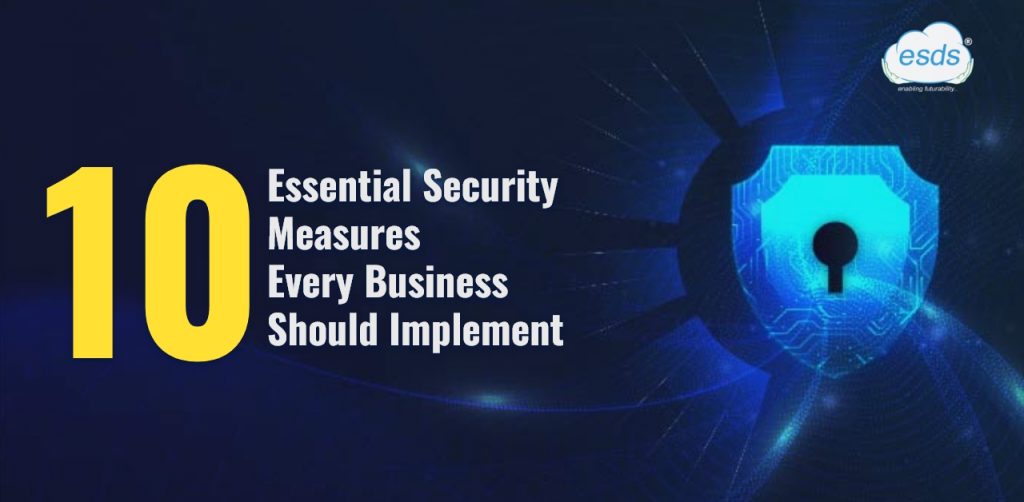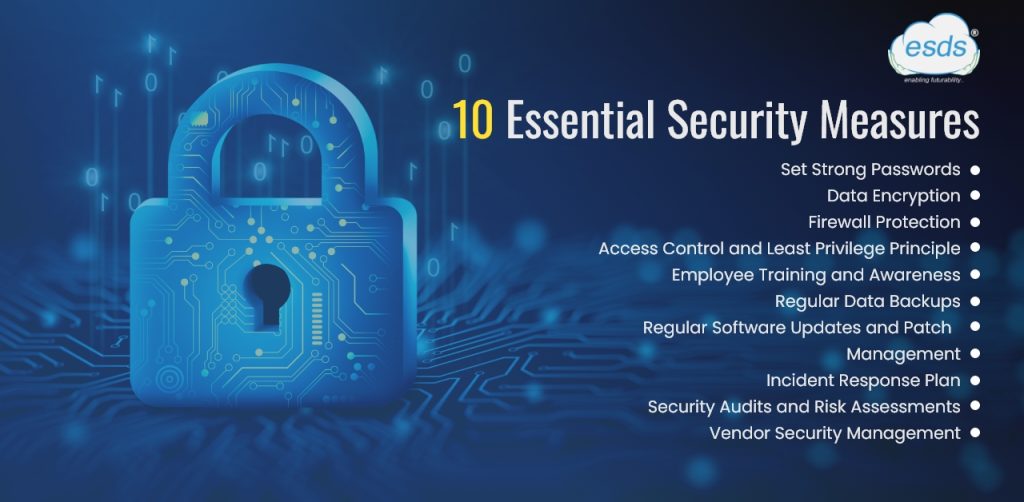10 Essential Security Measures Every Business Should Implement

The digital age has brought many business opportunities but has also introduced new threats. All businesses, from small start-ups to large organizations, are vulnerable to security threats. However, companies have solutions to tackle these challenges. Strong security measures not only protect private data but also safeguard the brand and build client trust. Here, businesses can opt for managed security services to protect their organization.
Let’s look at the overview of security risks businesses often face.
Overview of Security Risks for Businesses
Security risks can cause significant operational disruptions and financial losses to businesses. These threats might range from theft and damage to unauthorized access. In 2022, the average cost of data breaches globally was $4.35 million, while in the United States, it was more than twice as high, at $9.44 million.
This article analyses the unique physical security threats businesses face, highlights the value of solid security initiatives, and thoroughly lists the top 10 safety measures for businesses.
Importance of Security Measures for all businesses
Security measures are an essential defence against attacks that might jeopardize a business’s resources and operations. Maintaining an effective business requires adequate protection, which could improve customer confidence and employee morale. Moreover, investing funds in physical security ensures adherence to rules and demonstrates a commitment to protecting assets and the safety and health of employees and clients.
Business security measures are essential for the following:
- Protects clients and employees
- Business security maintains compliance
- Safeguards your data and systems.
- Controls access to any workplace
10 Essential Security Measures Every Business Should Implement

Set Strong Passwords
Computer security professionals have advised businesses and individuals to select strong passwords for online accounts, corporate software, and computer networks for decades.
Consider implementing centralized password management throughout your company to gain better control over this. For an additional level of security, use biometrics, fingerprint, or multifactor authentication.
Data Encryption
Having an encryption system in place makes sense if you regularly deal with data related to credit cards, social security numbers, and bank accounts. Encryption converts computer data into unreadable codes, protecting data.
Even if the hacker stole the data, the person would not have the keys to decrypt and interpret it. Encryption protects against the worst-case scenario. That’s an intelligent security feature globally when monthly data breaches amount to billions of records.
Firewall Protection
How do firewalls and antivirus software differ from one another? Any business with its own physical servers can benefit from having a firewall since it safeguards both software and hardware. However, an antivirus targets software that has already been impacted by a virus that has already made its way into your network. In contrast, a firewall also blocks or prevents viruses from entering it.
Installing a firewall helps secure a company’s incoming and outgoing network traffic. It can prevent network attacks by hackers by blocking particular websites. Businesses can also configure managed security services to avoid sending private emails and proprietary data from their network.
Here, it doesn’t end. You must ensure that it has the most recent firmware or software updates installed regularly.
Access Control and Least Privilege Principle
One significant security strategy is limiting the number of individuals accessing critical data, such as the CEO, CIO, and a small group of trusted employees. It further reduces the possibility that bad actors within your organization have illegal access to data, which will reduce the impact of a data breach if any occurs. PAM, or privileged access management, addresses the processes and technologies required to protect privileged accounts.
Protecting data from insider threats requires limiting access to specific data and restricting who can access it. However, it’s also essential to inform employees that such a security measure is active so they can be proactive and notify their managers of poor information hygiene.
Employee Training and Awareness
A significant cybersecurity skills shortage continues to plague organizations. 70% of cybersecurity professionals report their businesses are feeling the effects of this skill gap. It isn’t a new trend. Data over the past four years shows the percentage has hovered between 69% and 74%, highlighting a lack of progress in addressing this critical issue.
Organize regular training sessions to train employees about potential security dangers, phishing scams, and password hygiene. Employees can function as the first line of protection against cyberattacks if the organization cultivates a security-conscious culture with managed security services.
Regular Data Backups
Make regular backups of all essential data on all systems and store them safely, ideally off-site or in a secure cloud service, to prevent data loss from cyberattacks, hardware malfunctions, and natural disasters.
Regular Software Updates and Patch Management
Only around 50% of organizations have a documented patch management process.
Cybercriminals find it easy to target unpatched systems and outdated software. Web applications often contain security bugs, so we must install updates or patches. Vulnerabilities in modern apps include failure cryptography, broken access control methods, and misconfigured security. Ensure you regularly update each device, operating system, and software application on your network with the most recent security updates. For maximum efficiency and reduced vulnerability, consider implementing automated patch management systems.
Incident Response Plan
Even with hostile security measures, a breach can occur. An extensive incident response plan helps prepare businesses to mitigate these kinds of threats.
This is where the SOC as a Service analyst role comes in. The SOC analyst analyzes suspicious activities to determine the threat type and the degree of infrastructure penetration. The security analyst adopts an attacker’s viewpoint to investigate the network and activities of the business in question, searching for vital signs and vulnerabilities before they are exploited.
Security Audits and Risk Assessments
Regular risk assessments and security audits help find holes and gaps in your infrastructure and processes. To find potential security gaps:
- Thoroughly evaluate your network, systems, and apps.
- Use penetration testing to simulate real attack scenarios and assess how well your security policies work.
- Based on the findings, prioritize remediation efforts to resolve essential vulnerabilities quickly.
Vendor Security Management
Many businesses depend on outsourced vendors and service providers for various functions. However, these vendors could pose security threats if they are not adequately screened and managed. Implement rigorous managed security services for vendors to assess third-party vendors’ security posture, enforce contractual security obligations, and monitor vendors’ adherence to laws and industry standards.
The policy should cover managing a company’s vendors and the vendor acquisition process. The organization should evaluate the business associate’s ability to generate, receive, maintain, or transfer confidential data on behalf of the company.
Wrapping Up
Businesses of all sizes must implement these security best practices and privacy protocols. By doing this, companies can build client and employee trust while protecting their sensitive information. It’s important to remember that maintaining cybersecurity requires constant attention to new threats.
ESDS provides all-inclusive solutions to strengthen your company’s security infrastructure. Using the latest technologies and a team of experts, ESDS protects your valuable assets and confidential information from cyber-attacks with comprehensive managed security services.
Make cybersecurity a high priority in your company to safeguard your digital assets and maintain your customers’ trust.
- Why no backup plans even after repeated global IT failures? - February 25, 2025
- Can BFSI community cloud solve data security challenges in banks? - February 3, 2025
- How to Assess SOC-as-a-Service Factors, Benefits, and Challenges? - January 7, 2025
